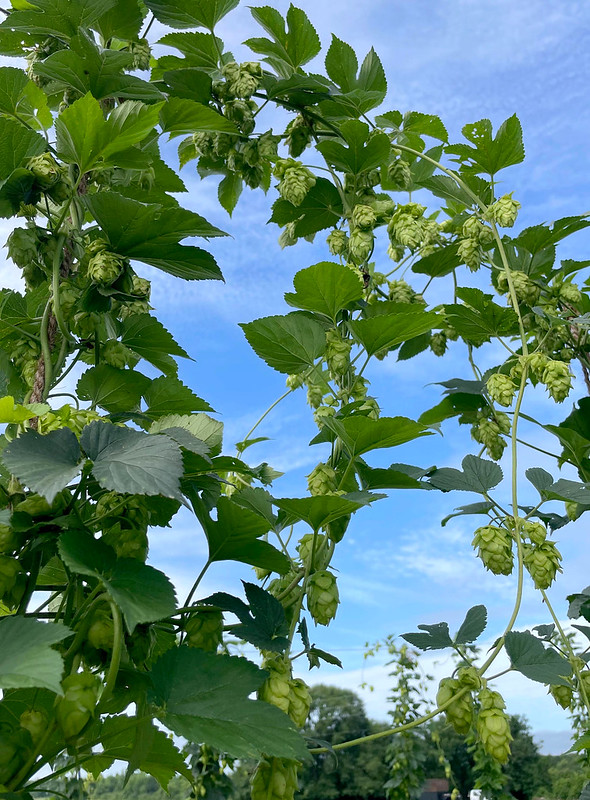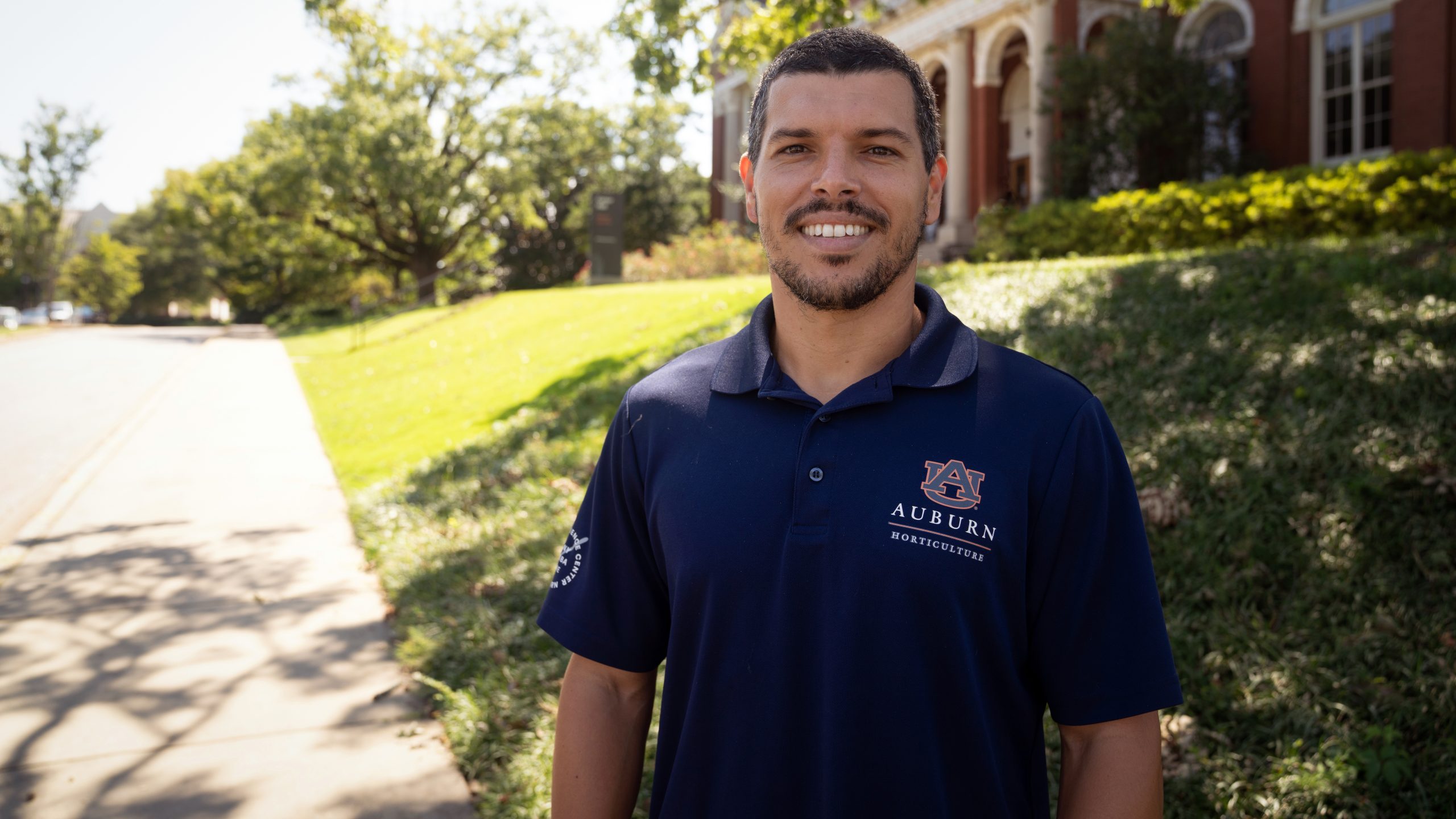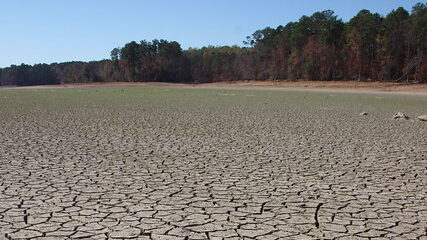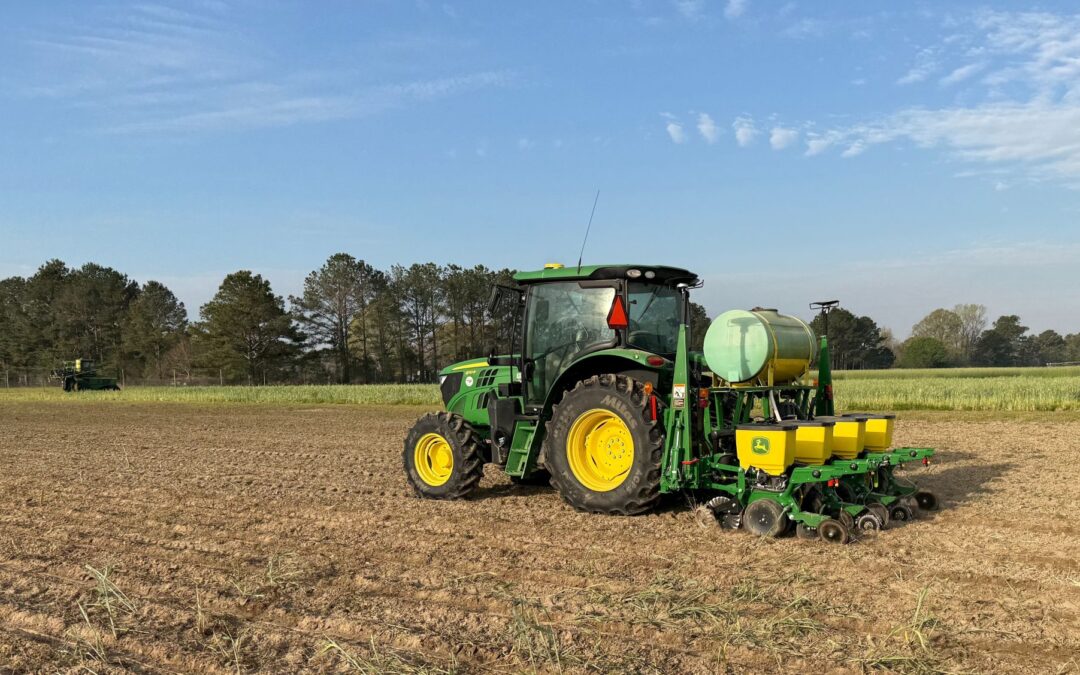By Rachel Damiani
Assistant Professor Andre da Silva is conducting cutting-edge research on ways to grow hops in Alabama within Auburn University’s Department of Horticulture in collaboration with faculty, industry leaders and students. As an Alabama Extension vegetable specialist, da Silva also shares his research findings with growers and brewers.
“Our goal is to provide information from the bine to the tap reaching hop producers, brewers and consumers,” da Silva said.
Da Silva, who is a recent recipient of the Professional Early Career Award from the American Society for Horticultural Science, has received multiple grants from both Auburn and the USDA, totaling approximately $200,000. The overarching aim of his research is to uncover how to grow hops in Alabama by identifying suitable varieties, or cultivars, and providing recommended crop management practices.
This is a timely research focus, given that hops — which are the flower, or cone portion, of the perennial Humulus Lupulus plant — are a key ingredient in beer for their preservative properties, flavor and smell.
“The beer industry has steadily increased in the last two decades, but they rely on hops being imported. So, if we have our own hops with high quality, that would be ideal for the local brewery industry,” he said.
Currently, about 98% of hops are grown in the Pacific Northwest. The reason: hops plants are finicky to grow, da Silva said. They require about 16 hours of sunlight and moderate temperatures. If the conditions deviate from this desired range — such as in the southeast that has shorter days and higher temperature — they won’t grow well.
But if the hops plants get what they need, their growth is astonishing. Hops plants can grow up to 10 inches a day and reach a maximum height of 12 to 18 feet, requiring even the tallest scientists to use a ladder when harvesting hops.
Da Silva, who has published over 93 peer-reviewed research and extension papers combined and amassed over $2 million in funding across his areas of research, is uncovering how to overcome challenging climate conditions in Alabama by conducting real-world research on Auburn’s campus in the greenhouse and in the field, known as the hop yard, in the E.V. Smith Research Center, and most recently, in the Ornamental Horticulture Research Center.

Hop plants can grow 12 to 18 feet tall at peak growth, requiring harvesters to use a ladder. Pictured here is Michael Phillips, a former undergraduate research assistant.
HARNESSING SCIENCE TO GROW HOPS IN ALABAMA
Compared to the Pacific Northwest, the southeast has shorter days during the growing season, as well as hotter and drier conditions — posing unique hurdles for hops plants.
To address these potential issues, da Silva has tested two different mulching systems by covering plants in the hop yard with pine bark or black fabric and comparing these plants’ growth and soil moisture to those plants without mulching. He discovered hop growth and soil moisture were highest for the plants covered with pine bark and the black fabric.
“When we start to use those fabrics, we warm the soil and induce water intake and plants will grow faster,” he said.
While crop management practices can aid hops’ growth and avoid pesky weeds, da Silva says growers may still encounter unavoidable issues. To address this, da Silva has investigated which cultivars of hops plants are best suited for Auburn’s dry and hot conditions.
Specifically, he planted 16 different hop cultivars side by side in the greenhouse. He then subjected these plants to water stress. His results indicate that Cascade and Chinook may be well-suited for Alabama. Simultaneously, he surveyed brewers about preferred cultivars.
Da Silva’s not only interested in how to cultivate the needed conditions to grow hops in Alabama, he’s also collaborating with Alex Harkess, an adjunct faculty member in Auburn’s College of Agriculture and a faculty investigator at HudsonAlpha Institute for Biotechnology, to promote efficiency related to harvesting hops.
“The plant can be either male or female, but only the females make those big, beautiful hop cones that are useful for beer productions,” said Harkess. “So, in a species that is 50-50 male and female, only half your crop that you plant from seed or cuttings will end up being useful.”
Ideally, growers would be able to plant only the profitable female plants. The problem: male and female seeds look identical.
That’s where genetics come in. The scientists have worked together to better understand “what makes a male a male and a female a female” at the genetic level by leveraging genome sequencing approaches, Harkess said.
Their initial findings served as important preliminary data for a USDA National Institute of Food and Agriculture fellowship obtained by Sarah Carey, a postdoctoral associate at HudsonAlpha who is mentored by Harkess. Among her goals, Carey focused on identifying genes that determine sex on the hops plant and creating a reference genome for multiple hop plant varieties.
“Auburn, being the land-grant institute in the state, has some of the best expertise in the southeast for growing diverse crops in diverse places,” said Harkess. “And what HudsonAlpha has expertise in is doing large-scale genome sequencing and plant genotyping, so those two really go hand-in-hand together.”
SHARING SCIENCE WITH GROWERS, AND HOPS WITH BREWERS
Da Silva’s work doesn’t stop with the scientific results; he actively works to translate his findings for growers.
“Having hops research at Auburn doesn’t help only our research, but also benefits students and our community,” said da Silva. “We are providing guidelines based on our research, so we are translating scientific information to help growers.”
He meets with growers regularly to share information about best practices, with the hopes they will be able to contribute to a booming hops industry in Alabama. These future hops grown in Alabama will likely not have too much trouble finding a home. Brewers across the state are eager to use locally grown hops in their beers.
This connection between growers and brewers is being piloted right here on campus as part of the FoodU campus initiative through a collaboration between the College of Agriculture and Auburn’s Brewing Science and Operations program within the College of Human Sciences, said Desmond Layne, head of the Department of Horticulture.
“We are proud of our FoodU campus initiative and our ever-increasing number of talented partners,” said Layne. “FoodU links the growing of specialty crops with the utilization of those crops for food in campus dining and the culinary sciences program and also for aesthetic and future value-added purposes.”

Hops are the flower, or cone portion, of the perennial Humulus Lupulus plant.
As part of the FoodU initiative, da Silva began working closely with Clark Danderson, an assistant professor and director of the Brewing Science and Operations program, to see whether hops grown right here in Alabama could help create a high-quality, local beer.
“To me, the benefit of cross-disciplinary research is that it connects different perspectives and backgrounds to solve challenging problems with real-world implications,” Danderson said about this innovative hops research.
This team expanded when Layne introduced da Silva to Drew Kostic, head brewer and general manager at New Realm Brewing at Auburn, over lunch.
“The excitement was palpable on both sides,” said Kostic, who is a graduate of Auburn’s Brewing Science and Operations Program. “This type of collaboration is what I’m here to do —work with the state and the community to make the best possible beer we can and help put Alabama beer on the map further.”
Their goal: bring da Silva’s hops to create an Auburn beer by the fall 2024 football season.
They may even get festive with their offerings, using pumpkins grown from da Silva’s research to make a fall-themed beer.
This collaboration deftly taps into the locally-sourced food movement and has caught the interest of others looking to replicate their partnership across the country, Kostic said.
Another strength of this endeavor is that students, including future leaders in the hospitality management industry within the Horst Schulze School of Hospitality Management, will have a unique vantage point and hands-on educational experience through their involvement with New Realm Brewing within the Tony & Libba Rane Culinary Science Center.
Danderson also says he plans to share insights about local hops and da Silva’s research with his brewing science students.
“They say rising tides lift all boats, and that’s what we’re here to do is really make Alabama beer and beer across the United States better by working together, partnering with each other and sharing this knowledge with our students,” Kostic said.
Until then, more research projects are underway to address the impact of crop management practices and environmental conditions on hop production in Alabama. Da Silva says hops research and yield will be bolstered by Auburn’s new hop yard in Mobile, Alabama that can accommodate 300 plants.
“We’re going to be able to provide hops in larger scales so that we can provide bigger batches to the Auburn brewery,” da Silva said.





